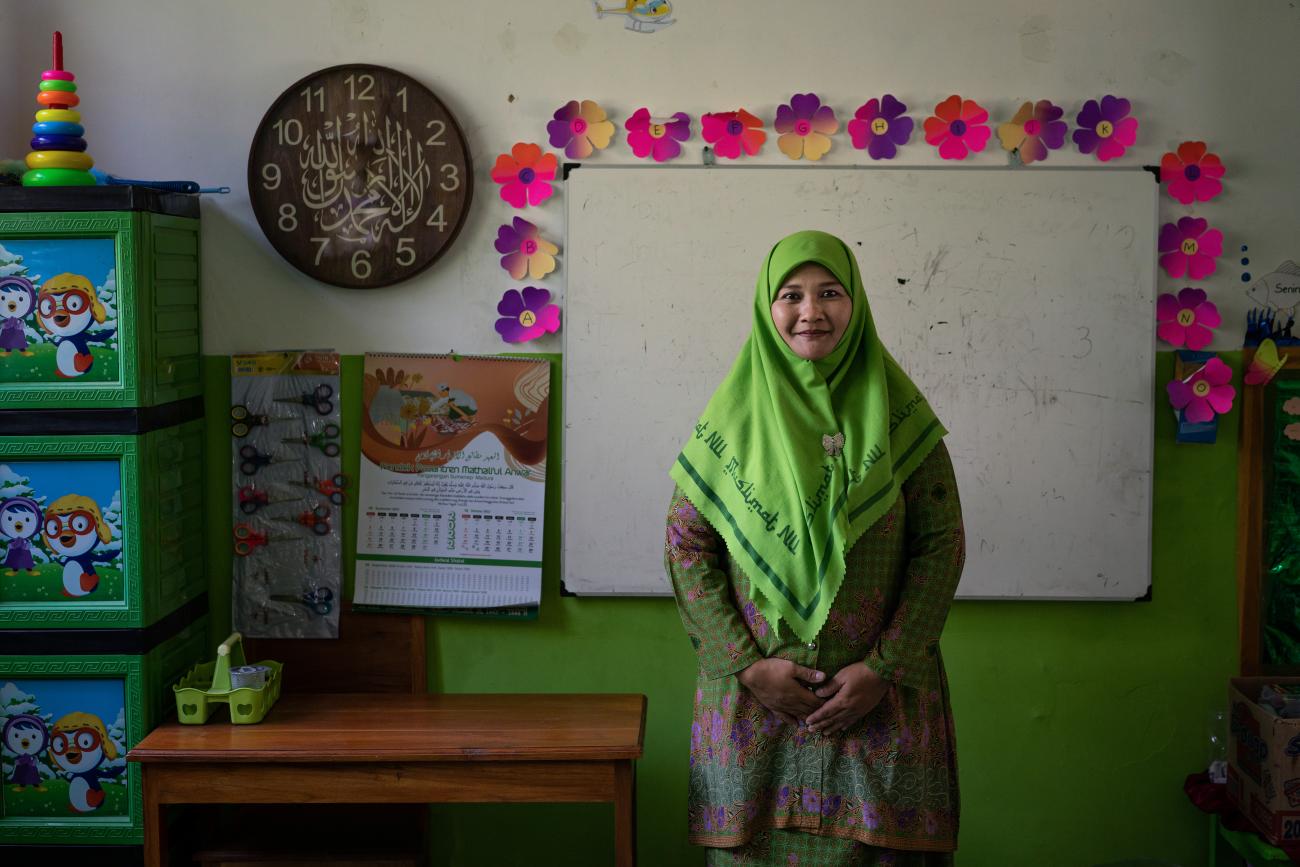Madura’s historic breakthrough brings hope for children

“Aunties” help Madura’s immunization programme make history
As September approaches on the island of Madura, East Java, the leaves begin to turn brown, the grass dries up and the dust scatters in the wind. The arid soil and scant rainfall make the heat of the dry season feel even more oppressive.
Amid the unfriendly weather, Alfiatun, a middle-aged community leader, shows up at a small mosque in Kalianget, Sumenep — one of four districts on the island — to deliver a sermon on parenting in Islam and the importance of immunization for children. Clad in a bright green veil and batik dress, she speaks with a soft but commanding voice that gets the attention of the congregation. "Immunization is good, healthy and saves our children," the single mother of four proclaims to the dozens of families in attendance.
UNICEF/2022/Fauzan Ijazah
Alfiatun delivers a sermon to her congregation on the importance of immunization for children.
Since August, Alfiatun has been setting aside 20 to 30 minutes towards the end of her weekly sermon to provide information on immunization. UNICEF and the district government reached out to her for support before the launch of a nationwide immunization catch up campaign to address the major backslide during the COVID-19 pandemic.
As a member of a health cadre and a leader of Muslimat NU —the women’s chapter of the world’s largest Islamic organization, Nahdlatul Ulama—in Kalianget, she is well aware of the island’s low immunization coverage and has decided to preach about the topic and help with the immunization drive.
Madura has recorded the lowest rate of childhood vaccination coverage in Indonesia for decades. This leaves local children vulnerable to infectious diseases. When East Java experienced a polio outbreak from March 2005 to April 2006, for example, 45 of the 46 total cases were reported in Madura.
Sumenep, the only archipelago district in Madura, is made up of 125 islands, with some as much as a 20-hour boat journey away from the main island. The challenge the district’s geography poses to vaccination efforts, is compounded by misinformation and conspiracy theories spread across social media that leave many reluctant to immunize their children such as false links between vaccination and childhood paralysis and mortality.
A baby receives immunization at a posyandu in Manding Sumenep, Madura Island during BIAN
To address the situation, the district government began reaching out to “aunties” at community events, including social gatherings and religious congregations. The term encompasses a diversity of women with and without children who are invested in the community’s future—including influential women leaders like Alfiatun, as well as women exposed to online and offline misinformation on vaccinations, explains Hendrix Prasetyo, Administrator of the Health Surveillance and Immunization Section.
"We chose to be closer with aunties because they are the ones who are close to their children," he says. "We cooperate with them to fight against [hoaxes]."
Record breaking impact
Alfiatun is not operating alone – there are nearly 5,000 aunties like her in Sumenep who were advocating for child vaccination as part of an integrated immunization initiative known by the acronym GRIDU.
"GRIDU was taken from our local language, it means noisy and boisterous, reflecting our massive and integrated action," explains Nia. "Not only did we urge people in the Puskesmas (public health centre) and Posyandu (integrated health centre) to get their children immunized, but we have also encouraged local leaders to advocate for immunization in their communities."
This collaborative action involves all parts of society – from government organizations like the Family Welfare Programme acting as the driving force for aunties, sub-district heads and village heads – to the police and military who act as safeguards by cracking down on hoax spreaders for the success of the programme.
Moreover, religious organizations such as the local Ulema Council, congregations of Aisyiyah Muhammadiyah as well as Fatayat and Muslimat NU are involved in promoting immunization, preventing misinformation and encouraging families to vaccinate their children.
As a result, Sumenep has now become one of the districts with the highest rates of immunization in East Java. In December 2022, child vaccination coverage in Sumenep reached 98.88 per cent, which equates to 55,337 children vaccinated for measles and rubella, compared to only 31.8 per cent in the previous year.
UNICEF/2022/Fauzan Ijazah
Standing in front of the city’s grand mosque, Dewi Khalifah talks about Sumenep’s success and hopes for BIAN.
“This milestone has been achieved because of our strong cross-sectoral collaboration,” said Dewi Khalifah, the vice-regent of Sumenep, as she stood in front of the city’s grand mosque. “We hope that our cadres, public figures and aunties with children will not only immunize their children but be a driving force for immunization in their communities in the future.”

